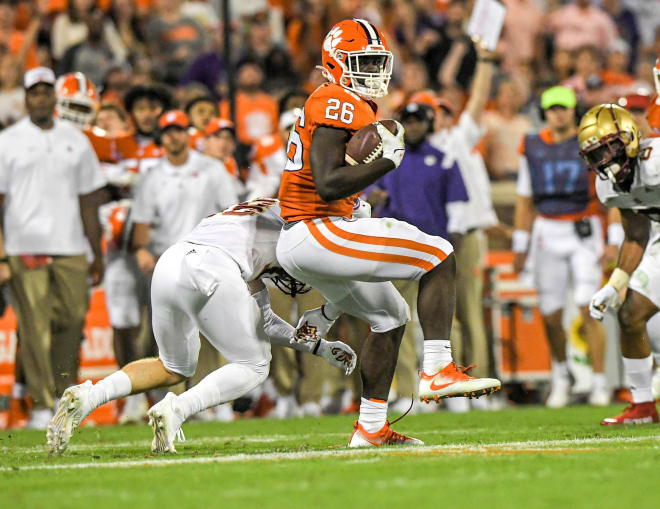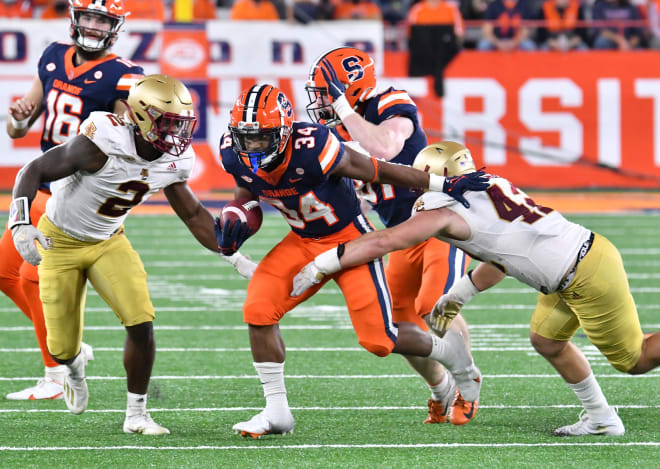To Go From Good to Great, BC's Defense Knows It Has to Stop the Run

Since Jeff Hafley has taken over as Boston College's head coach, he and his staff have helped begin the restoration of the Eagles' defensive tradition.
The program was abysmal on that side of the ball in 2019, Steve Addazio's seventh and final year as the team's front man. That season, BC ranked tied for 101st in points per game allowed (32.2), 100th in rushing yards per game allowed (193.23) and 122nd in passing yards per game allowed (285.5).
Addazio's Eagles even set and reset the program's single-game record for total yards allowed, giving up 664 at Louisville and then a ghastly 674 at Clemson.
Hafley, a defensive back guru, has already left his imprint on two of the three major defensive statistical categories. In 2020 and 2021, BC ranked 60th (28.4) and 31st (22.2) in points per game allowed, respectively, as well as tied for 82nd (245.5) and third (173.5) in passing yards per game allowed.
On the other hand, BC has yet to see significant improvement when it comes to stopping the run. Each of the past two seasons, the Eagles have given up approximately the same game-to-game rushing yardage (171.4 in 2020 and 170.3 in 2021). Interestingly enough, BC's 2020 mark was 73rd while its 2021 mark was 92nd, and that's only partly because there were fewer FBS teams competing in the COVID-19-affected 2020 season.
There might have been a disparity in their rush D national ranking, but the Eagles' problem remained the same: They couldn't stop teams from running the ball down their throats. BC—which hasn't had a top-50 rush defense since 2016—gave up 19 plays of 20 or more rushing yards in 2021, tied for 87th nationally in that category.
What's more, for the second year in a row, BC gave up at least 4.5 yards per carry. That number is written in big font on the board of the Eagles' defensive team meeting room.
"To me and this defensive line, that's obviously embarrassing," sophomore defensive end Donovan Ezeiruaku said. "That's not something we take pride in because we take pride in stopping the run."

Ezeiruaku said the goal is allowing fewer than 3.0 yards per carry this season. He added that, if a team can't stop the run, it can't pass rush, either. That's the other department where BC has been lacking. In fact, the Eagles haven't ranked better than 10th in the ACC in sacks per game since 2018. Last year, BC—which logged the fifth-worst Pro Football Focus pass rushing grade (63.2)—registered a mere 1.75 sacks per contest.
Getting to the quarterback also applies to run defense. The Eagles have struggled to contain dual-threat signal callers for years. During the final seven games of the 2020 season, opposing quarterbacks averaged 83.4 yards on the ground against BC. Last season wasn't much better for the Eagles, who allowed Louisville's Malik Cunningham to rush for 133 yards and three scores and Syracuse's Garrett Schrader to shred them for 78 yards and a touchdown. That's not to mention Clemson's DJ Uiagalelei and Georgia Tech's Jordan Yates, both of whom topped 45 yards on the ground.
Ezeiruaku said containing mobile quarterbacks is "an everyday thing" for BC, heading into this season.
Hafley explained that, in 2021, BC defensive coordinator Tem Lukabu called the game with an emphasis on getting teams into third down, playing great red zone defense and not giving up explosives. The Eagles were 27th in the FBS in opponent third-down conversion rate (34.7%), 29th in opponent red zone scoring percentage (76.9%) and tied for 29th in opponent scrimmage plays of 40-plus yards (10).
That's why the Eagles gave up as few points as they did last season. And that, ultimately, is the stat Hafley cares the most about.
"It depends how you call the game," Hafley said earlier in fall camp. "Do you want to be really aggressive to stop the run? Then you try to cut stuff up and blitz. Then, all of a sudden, a guy gets out of his gap and what happens? You give up an explosive. That's how you score touchdowns, with explosives."
Hafley did say BC will be more aggressive in certain situations this year. And Lukabu mentioned the Eagles will be adjusting their scheme accordingly.
Above all else, though, Hafley's confident the Eagles will be better at stopping the run, given their personnel returning and their newfound depth.
BC has defensive tackle Chibueze Onwuka back after the veteran tore his Achilles last preseason. Plus, defensive end Marcus Valdez—who missed the first three games of 2021 with a thumb injury—is full strength. To top it off, BC has added hordes of young talent up front. The last two years alone, the Eagles have signed 11 defensive linemen.
"Our run defense was not good enough last year," Valdez said. "That all starts up front. You can't depend on the secondary. We gotta do our job."
It's also the job of BC's linebackers. Not one of the Eagles' top-13 run defenders last season, according to PFF, was a linebacker. Vinny DePalma and Kam Arnold both posted missed tackle rates of 13.7%, and Isaiah Graham-Mobley was behind them in that regard at 14.6%. Although Bryce Steele didn't miss a tackle as a true freshman, per PFF, he did rank dead last in PFF run defense grade (42.6).
Steele believes BC's linebacking corps—which returns DePalma and Arnold and will heavily feature Steele and redshirt freshman Jaylen Blackwell—"is probably the most athletic" in the ACC, if not the country.
It's a unit predicated on playing with speed and violence.
"A lot of teams think that they can run the ball down our throat," Steele said. "We're gonna try to force them to pass the ball on us. ... Our defense is definitely playing with a different edge."
Opponents certainly had that mentality last season. The Eagles were rushed against in non-garbage time the 24th-most often nationally in 2021, according to Parker Fleming of Football Outsiders. In a nutshell, teams were running on BC more than they were going to the air.
BC's secondary was well aware of that phenomenon, too.
"We're out for bigger and better next year," graduate cornerback Elijah Jones said. "I'm not satisfied with just being the third pass defense in the country. I want to be like top-five defense in the country. Stopping the pass is OK, but if they don't throw the ball, then it doesn't matter."
Lukabu emphasized that he and his players are "very aware" of the team's rush defense deficiencies in the past. The third-year DC said he takes it personally.
It all goes back to playing with that edge Steele mentioned.
"It's not about being a nice guy," Lukabu said. "Because, if you are, those guys on the other side of the ball, they're so good nowadays, they'll take your heart.
"I'm not about that life."